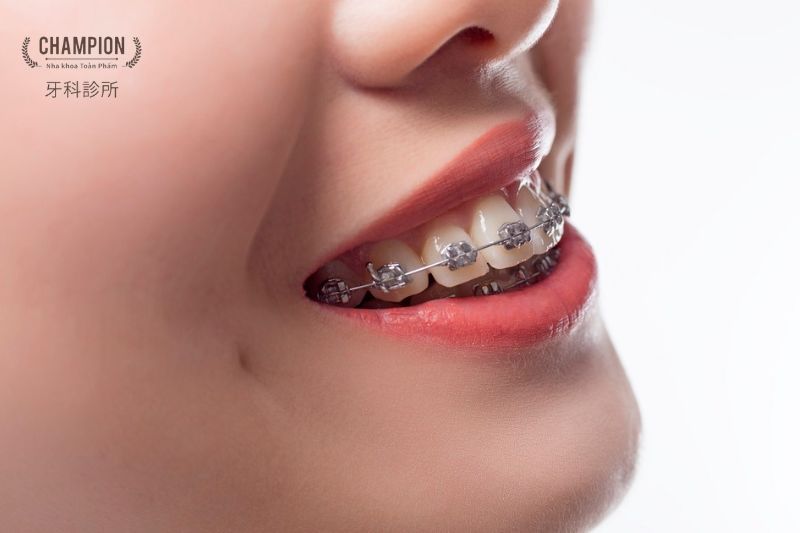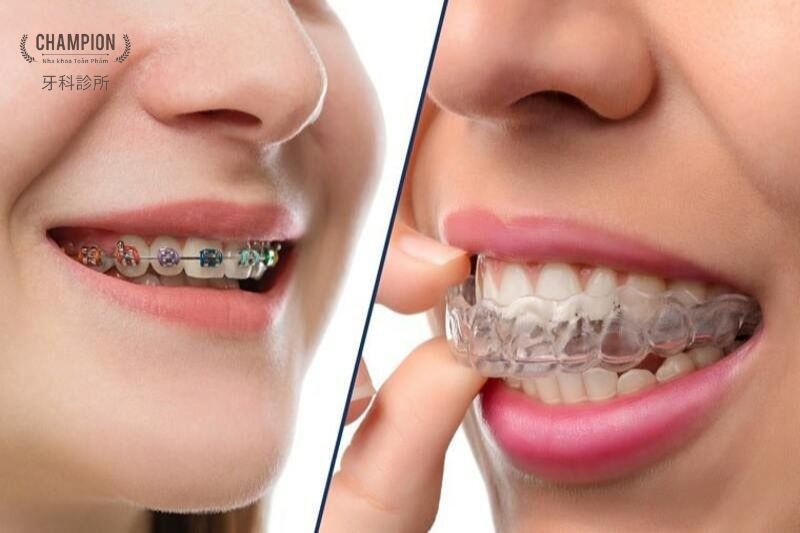Braces are an effective and commonly used dental treatment to enhance the appearance and alignment of teeth. However, many people wonder if braces can fix an overbite and what considerations should be taken into account when opting for this method. Follow the article below from Champion Dental Clinic to get the most accurate answers.
Common Overbite Correction Methods Nowadays
Currently, there are two popular overbite correction methods: braces with brackets and braces without brackets. Each method has its own advantages and disadvantages.
Braces with Brackets
Braces with brackets are orthodontic appliances that use brackets and archwires to move teeth into the correct position on the dental arch. The brackets can be made of metal, ceramic, or crystal. The archwires are typically made of stainless steel or gold alloy.
Advantages:
- High effectiveness, capable of correcting various overbite conditions, including severe cases.
- Shorter treatment duration compared to braces without brackets.
- Lower cost compared to braces without brackets.
Disadvantages:
- Discomfort and interference with eating and oral hygiene.
- Regular adjustments are required to maintain corrective force.
- May leave visible marks on teeth after removal.
Braces without Brackets
Braces without brackets involve the use of clear aligners to move teeth into the correct position on the dental arch. The aligners are made of flexible plastic and can be easily removed.
Advantages:
- High aesthetic appeal, as there are no visible brackets during communication.
- Easy oral hygiene maintenance and comfortable eating.
- No need for regular adjustments.
Disadvantages:
- Lower effectiveness compared to braces with brackets, may not address severe overbite conditions.
- Longer treatment duration compared to braces with brackets.
- Higher cost compared to braces with brackets.

Does braces fix overbite?
Braces are an orthodontic method that utilizes dental appliances to move teeth into their correct positions on the dental arch. Braces can effectively address overbite issues, resulting in well-aligned and harmonious teeth with the facial structure.
However, the effectiveness of braces in correcting overbite depends on the underlying cause. If the overbite is caused by tooth misalignment, braces can yield high effectiveness by shifting the teeth into the proper position and visibly improving the overbite condition.
If the overbite is related to jaw misalignment, braces can still contribute to improvement, but their effectiveness may not be as pronounced as when the overbite is caused by tooth misalignment. In cases of severe jaw misalignment, a combination of braces and jaw surgery may be necessary for comprehensive correction.

Is Overbite Likely to Recur After Braces?
Braces involve a process that requires patience and careful maintenance, and once the treatment is completed, maintaining the results is crucial. Even after braces are removed, your dental arch has not yet reached maximum stability. The bone and gums need time to adapt to the teeth's new positions. Therefore, your orthodontist may recommend continuous wear of a retainer for a period ranging from 6 months to 1 year.
While the majority of cases result in successful orthodontic outcomes without relapse, there are instances where relapse may occur. Some reasons for relapse include:
- Improper technique in applying braces: If the orthodontist lacks expertise or fails to accurately assess your dental condition, there is an increased risk of relapse after braces removal.
- Non-compliance with the orthodontist's instructions: Failure to follow the orthodontist's recommendations, such as not wearing the retainer for the prescribed duration or inadequate oral hygiene, may lead to teeth shifting back to their original positions.
- Poor habits: Certain detrimental habits, such as tongue thrusting, teeth grinding, or mouth breathing during sleep, can contribute to the teeth reverting to their original positions.

>> See more: Reversed bite braces: Time and cost of implementation
How to Minimize the Risk of Braces Relapse?
To minimize the risk of braces relapse, it's important to consider the following:
Choose a Highly Skilled Orthodontist
Selecting an orthodontist with high expertise is crucial. A highly skilled orthodontist will accurately assess the condition of your teeth and devise a suitable treatment plan, reducing the likelihood of braces relapse.
Strictly Follow the Orthodontist's Instructions
Orthodontists provide specific guidelines during the braces process, such as wearing retainers and maintaining oral hygiene. Strict adherence to these instructions is essential to achieve the best treatment outcomes and reduce the risk of teeth shifting back.
Limit Bad Habits
Certain detrimental habits like pushing teeth with the tongue, teeth grinding, or mouth breathing during sleep can contribute to braces relapse. Eliminating these habits is necessary to minimize the risk of teeth reverting to their original positions after braces.
Regular Check-Ups
Regular dental check-ups are essential for the orthodontist to monitor the condition of your teeth and adjust the pulling force accordingly. This helps ensure that your teeth move into the correct positions and minimizes the risk of relapse.
Maintain a Proper Diet
Consuming a well-balanced diet with sufficient nutrients is crucial for maintaining healthy teeth. Avoiding hard, chewy foods during the braces process can prevent damage to the braces.
The detailed information provided by Champion Dental Clinic in their article covers various aspects of braces and overbite correction. For the most accurate information regarding overbite correction through braces, it is recommended to visit Champion Dental Clinic directly for a thorough examination and detailed consultation with their orthodontists.
Vietnamese & English: (028) 5411-2295
中文: (028) 5411-2297 172 Nguyen Luong Bang, Tan Phu Ward, District 7, Ho Chi Minh City.
Fanpage: Champion Dental Clinic 牙科診所
Zalo: Champion Dental Clinic
Youtube: Champion Dental Clinic 牙科診所
 Champion Dental Clinic
Champion Dental Clinic



